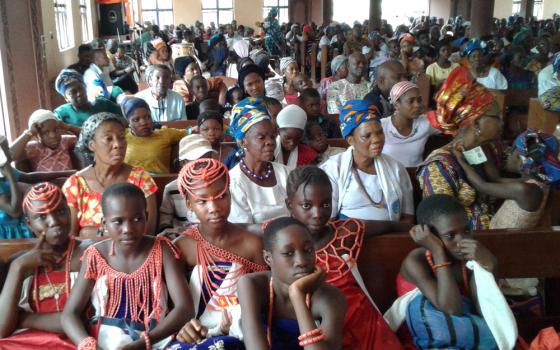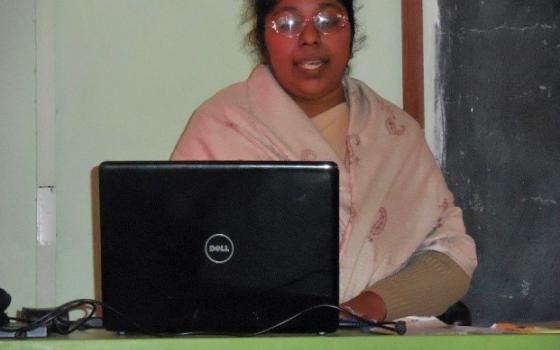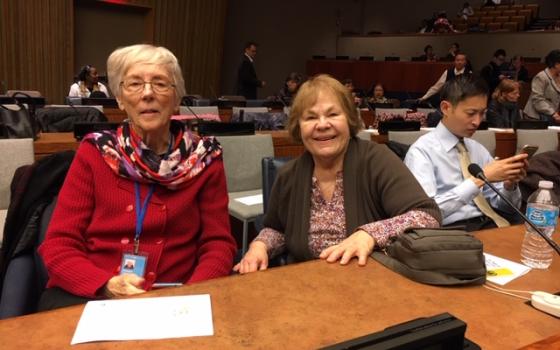Editor's note: How are you and/or your community helping in the fight against human trafficking? Please respond in 250 words or less to mmorek@ncronline.org by Monday, Feb. 4. We'll select responses to include in our observance of Feb. 8 anti-human-trafficking day and honoring St. Josephine Bakhita. Education … job programs … microloans … advocacy … legal aid … counseling ... these are just a few of the ways sisters are fighting what one panelist calls the "scourge of trafficking."
This month's panelists discuss human trafficking, its causes and its cures. These sisters and their congregations are educating villages, governments, and even the United Nations about trafficking and its impacts, and they are doing something about it themselves.
They wrote in response to the following question:
Trafficking in human persons has become the most lucrative business in our world today. What is your congregation doing to eliminate this new form of slavery in today's world?
______

Cynthia Mathew belongs to the Congregation of Jesus from India. A social worker and lawyer, she worked with the Dalit people, prisoners, women, and human trafficking victims. She practiced law in the Patna High Court, working for juvenile delinquents and victims of rape and domestic violence. She is now serving as a nongovernmental (NGO) representative to the United Nations for her congregation.
Trafficking in human persons has become the most lucrative business in our world today, the third largest international crime industry (behind illegal drugs and arms trafficking).
Although slavery is commonly thought to be a thing of the past, human traffickers generate hundreds of billions of dollars in profits by trapping millions of people in terrible situations around the world. The International Labor Organization or ILO estimates that there are 40.3 million victims in modern slavery globally; the U.N. reports that traffickers in armed conflict situations operate with special impunity.
Where there is movement, poverty and vulnerability, there are the traffickers; and there are also members of the Congregatio Jesu, working to protect and rehabilitate the victims, and prevent this heinous crime. In 2011 our General Congregational theme "Called to bring hope" urged us to seek new ways to respond to modern forms of oppression, such as human trafficking.
Some of our members are part of national and international anti-human trafficking networks. One of our sisters, Andrea Bezáková (Bohdana) of the Congregation of Jesus, a member of RENATE, Religious in Europe Networking Against Trafficking and Exploitation, works in Innsbruck, the Austrian Tyrol. She directs a new shelter and counseling center for women in western Austria who have become victims of human trafficking, forced prostitution, exploitation and violence.
In India I was a member of AMRAT, (Asian Movement of Religious Against Human Trafficking), part of Talitha Kum, the International Network of Consecrated Life Against Trafficking in Persons. I worked mainly to raise awareness about human trafficking and to prevent it at the local and state level.
Now at the U.N., I am a member of the NGO Committee to Stop Trafficking in Persons, which is committed to the prevention and eradication of human trafficking in all its forms, through advocacy and education. While the committee's work is primarily at the United Nations, it works in partnership with its member organizations and other stakeholders taking action on local and national levels. As committee members we are a powerful voice against human trafficking. Some of my congregation members are part of our own IBVMUNNGO (Institute of the Blessed Virgin Mary U.N. nongovernmental organization) network against human trafficking.
Since trafficking in persons occurs within countries and across national borders, we initiate actions that address it both locally and at the U.N. We facilitate organizing at all levels, especially the grassroots, access to U.N. processes and agencies, and collaboration with current anti-trafficking campaigns. We also advocate for stronger mechanisms to monitor compliance with commitments to prevent, protect and prosecute under the Palermo Protocols and the International Labor Organization.
We have joined hands to fight this modern slavery!

Kathie Shea A Medical Missionary of Mary, she ministered at their local, area and congregational levels in finance — in the United States, Ireland, and East and West Africa. In East Africa she worked with the Association of Sisters of Kenya. Now in their mission development office in Chicago, she serves as the congregation's business administrator for Brazil, Honduras and the U.S.
At our 10th Congregational Chapter in 2015, my congregation, the Medical Missionaries of Mary (MMM) acknowledged that we live in a wounded world — torn apart by greed, war and violence. One of the consequences of this is the displacement and trafficking of many people. Despite what we often see and read in the news, trafficking is not just about young girls or women. It is about young boys and men as well.
We MMM sisters and associates also have a core value of Compassion. As we say in our community documents: "Compassion is the ability and the willingness to enter into the chaos, the pain, the suffering and the story of another, allowing it to affect us though it were our own. When a reflex reaction causes us to help a stranger, with no motivation other than that person is in need, our compassion is in action."
In East and West Africa and here in the United States, Medical Missionaries are working to raise awareness about human trafficking and assisting victims— many of whom are actually trafficked in their own countries and sometimes by their own family members. We are particularly trying to raise awareness among young people and to provide needed counseling and/or medical services for them. When people are not educated or unemployed, it is all too easy to attract their attention with false promises of a better life.
We have been offering workshops to raise awareness of youngsters who have gone missing or have been forced into a false employment situation (domestic servitude). We also collaborate with other organizations in raising this problem with local and state government officials — as well as church officials — in the various countries where we live and work.
St. Benedict says in his rule, "Your way of acting should be different from the world's way: the love of Christ must come before all else … never turn away when someone needs your love" (Chapter 4:20-26). We endeavor to keep that in mind and with our deeds.
As our motto is to be "Rooted and Founded in Love" — then any man, woman or child who has been trafficked or could be trafficked clearly needs our unconditional love.

Judith Anne Zielinski A Franciscan Sister of Sylvania, Ohio, she is a television writer, producer and filmmaker. Her work has earned many prestigious awards. Formerly communications director for the Conference of Major Superiors of Men in Washington, D.C., she also worked for Family Theater Productions in Hollywood, California, and now directs faith and values programming for NewGroup Media in South Bend, Indiana.
Celestina was a high school principal in Nigeria and a mother of five children. As a professional, she valued education and knew that without it, her children stood little chance of advancing.
When she received letters from a family relative who had moved to America, inviting her to come to Ohio and work for good pay, Celestina was tempted. The departure would be painful; her youngest was only 8 years old. But the woman was a relative, and Celestina's husband could care for the children. After a tear-soaked farewell, she left for the United States.
Five years later, Celestina found herself a domestic slave, cleaning house, doing laundry, cooking meals, and even performing yardwork. The household included an adult woman with severe developmental issues whom Celestina fed, bathed and clothed. For these five years Celestina was paid absolutely nothing, and told that her room and board were fair compensation.
With the help of a sympathetic woman, Celestina escaped to Bethany House, a long-term domestic violence shelter in Toledo, Ohio, sponsored by my religious community, the Sisters of St. Francis of Sylvania, Ohio.
There Celestina found housing, support and legal aid. The FBI determined that she was a victim of international human trafficking and reunited her children with her. "That day was like a miracle," Celestina said. Bethany arranged for the children to stay with her in adjoining apartments.
Today Celestina works in the health care field and has bought her own modest home. Her oldest son and daughter are studying medicine and nursing in college.
Founded in 1976 by Sr. Rose Therese Lange, Bethany House has served many trafficking victims, about 20 in the last five years alone. Director Deidra Lashley notes the huge intersectionality between domestic violence and trafficking. She says, "Power and control, sexual abuse, addiction, financial abuse and poverty all intertwine."
I met Celestina and included her in a documentary film I produced on Bethany's healing ministry. While describing her years of captivity, she said, "I am a religious woman. I prayed to God, When will you deliver me? And He did. He really did hear my prayer."

Cecilia Oluchi Dimaku is in the Congregation of the Sisters of the Sacred Heart of Jesus, an indigenous institute in Nigeria; she first held business positions in schools, the diocese, and her community. After 12 years in leadership, she was missioned to the Sisters of the Holy Family in the U.S. where she works as payroll/personnel coordinator at their academy in New Orleans.
The dehumanizing practice of trafficking in human beings for the sex trade and labor force is a new form of slavery in this 21st century. It is a global problem, affecting the lives of millions of people around the world.
The United Nations reports that 70 percent of trafficked victims are women and girls. Traffickers prey upon the most vulnerable women to make a profit from selling them to pimps, recruiters, sweatshops and brothel owners.
The Congregation of the Sisters of the Sacred Heart of Jesus, Benin City, Nigeria, is committed to uplifiting the dignity of all human persons, especially women and children. We are actively involved in combating human trafficking with projects and programs aimed at prevention and rehabilitation of victims.
We work in collaboration with dioceses within and outside Nigeria; Nigerian governmental and nongovernmental agencies; and the Santa Marta Group in the United Kingdom.
We have two strategies: An enlightenment and awareness campaign which educates young people, market women, parents, community leaders and the general public on the reality of "travelling abroad" (illegal migration) and human trafficking.
Our other focus is prevention through job skills. In this strategy we establish grassroots development projects, mostly in rural Nigerian villages, that enable us to train and empower women and youth. This is a way to address the horrible effects of trafficking in human persons, and to prevent them from falling prey to traffickers or to a life of crime. These projects include cottage industry training and a micro loan program.
Our Sacred Heart Cottage Industry trains young women and men in weaving, dyeing and batik, sewing and knitting, and baking.
Our Fullness of Life Counseling and Development Initiative, or FULIFE, provides microcredit loans to mothers and widows, to enable them to make a living. We discovered in the process of our village enlightenment programs that most of the young women who are victims of trafficking are children of widows who feel they have to take care of their mothers and siblings.

Marie Josee Seide is a Daughter of Wisdom, and — in temporary vows — is their newest professed member for the U.S. Before entering she worked in Haiti for USAID, the International Development Bank, and the National Olympic Committee. In community, she worked in administration at a school for exceptional children, and now directs parish social ministries in Amityville, New York.
The International Labor Organization reported that in 2016 an estimated 40.3 million people were held in modern slavery, of which 25 percent were child victims. Often those victims tend disproportionately to be girls and women trafficked as sex slaves. Those staggering numbers point to many suffering and lonely souls — scared, mistreated and often forgotten.
The same year President Obama instituted January as National Slavery and Human Trafficking Prevention Month. He said, "Today, in too many places around the world — including right here in the United States — the injustice of modern slavery and human trafficking still tears at our social fabric."
Indeed it happens right under our noses, often within our own homes, our neighborhoods, our towns or villages.
This practice in our society has carried on over the centuries. Sadly, slavery is often a byproduct of human greed, selfishness, hatred for one another. It certainly shows disrespect for our own value, as God's handmade, cherished and treasured ones. This is such a deep poverty.
If this misery continues, it is because too many have yet to surrender to God's unconditional love, too many are vulnerable because of desperate financial situations, and too many others are ready to take advantage of their vulnerability.
Fortunately many organizations are standing and acting against this horrific practice, and developing deep awareness about it.
Among these groups is my community, the Daughters of Wisdom, who strongly believe that compassion, love and communal effort can conquer this darkness that seems to plague the whole globe. We pray; we sign petitions; we share thoughts and concerns with law enforcement leaders and political decision makers within our network.
We support LifeWay Network financially. They provide safe shelter and educational programs to survivors, so they can sustain themselves when they get back their freedom. In 2016, the Daughters of Wisdom sponsored a three-day workshop for the staff of Martin De Porres School for Exceptional Children in Elmont, New York. It was presented by Love146, an organization that works on preventing trafficking. We also sponsor an annual social activity for the high school girls of the same school to build up their self-worth and prevent them from being trapped in that trade.
Every little bit counts in this battle to end trafficking. Persistence is of the essence. It is our faith and our hope that, united as one, we will break them free.

María Alejandra Leguizamón Schija is a Dominican Sister of the Most Holy Name of Jesus in Tucumán, Argentina. Her academic preparation includes a pastoral specialization with an area of focus related to human trafficking. She works in pastoral ministry but also with a diverse group called Kawsay Network, which gives workshops for children through adults in border schools and neighborhoods.
The scourge of trafficking in persons has a very strong impact on society as a whole — indeed, it is a "low blow" to humanity. The very idea that one person can enslave another may be the deepest expression of dehumanization.
Since 2013, our congregation of Dominican Sisters of the Most Holy Name of Jesus has been part of the Kawsay Network (or Consecrated Life for a Non-Trafficking Society), a Latin American network that takes action in favor of the care of life, and which raises awareness of the problem of trafficking in persons. The network extends throughout Peru, Argentina and Uruguay.
The activities that my congregation carries out against trafficking are almost always through working in networks. In the Kawsay Network we work intercongregationally and "intervocationally," since we share the task with other religious congregations, laity, and laypeople who share a Gospel charism and spirituality.
In Argentina, we are organized by regions to carry out awareness campaigns, offering workshops for different target groups: young people, adults, and children from 10 years old and up. Other activities in which we engage are online radio programs. We were able to acquire a space on FM radio, where we produced several different programs with topics related to trafficking in persons: the psychological aspect; social, legal networks; education; its relation to migration, and the like. We invited people from civil society and the state who are experts in topics such as accompaniment of victims and networking with various local, regional, national and international institutions.
As women in religious life, and as international organizations that extend across all continents, we have been able to bring many resources to bear on this problem, including raising awareness through social networks and media.
Editor's note: How are you and/or your community helping in the fight against human trafficking? Please respond in 250 words or less to mmorek@ncronline.org by Monday, Feb. 4. We'll select responses to include in our observance of Feb. 8 anti-human-trafficking day and honoring St. Josephine Bakhita.






